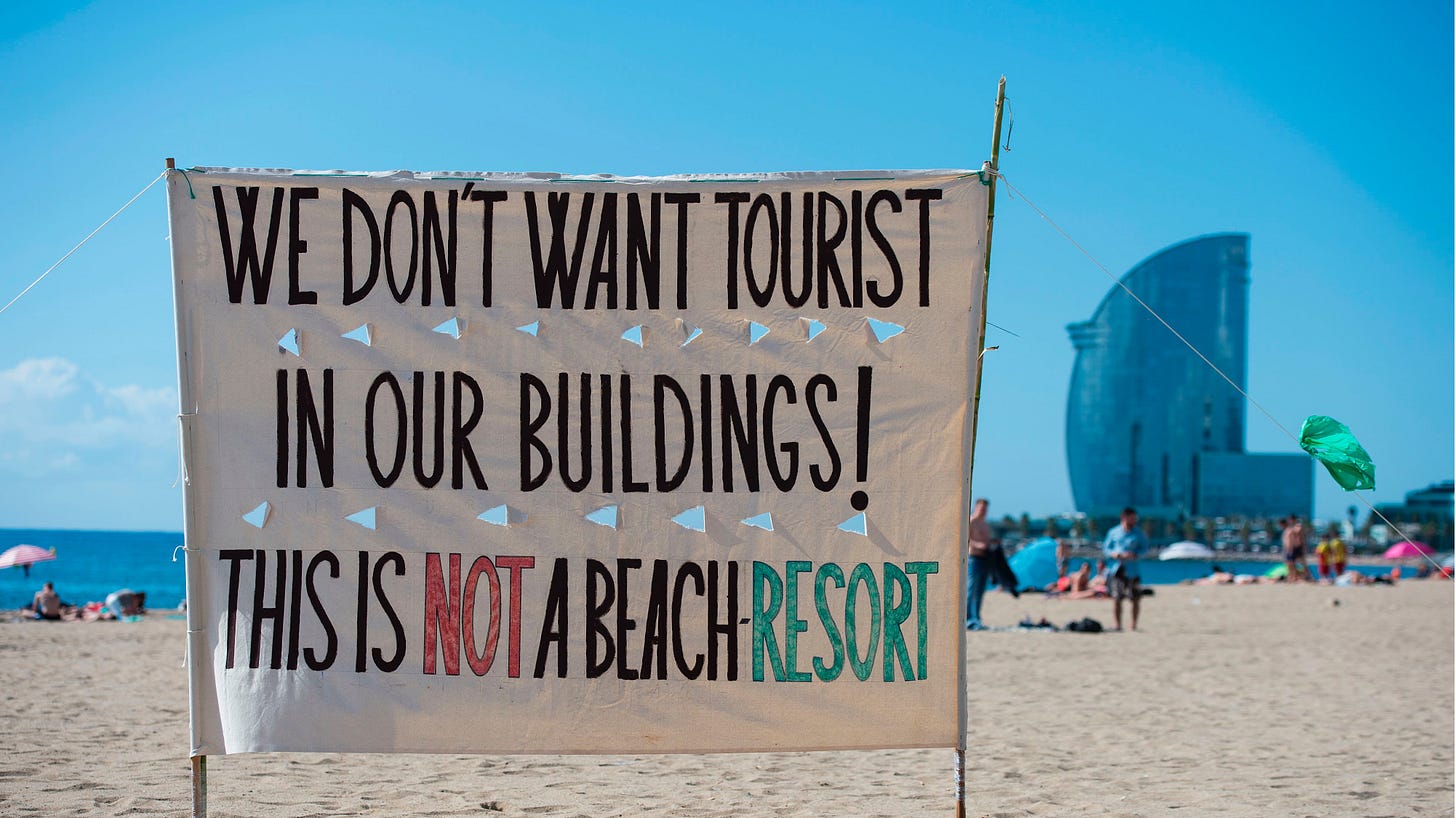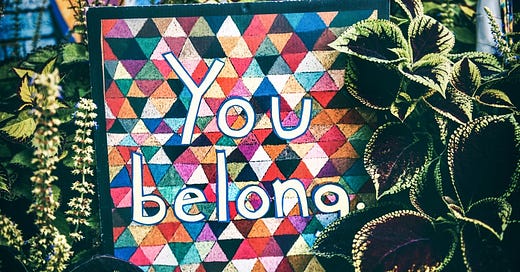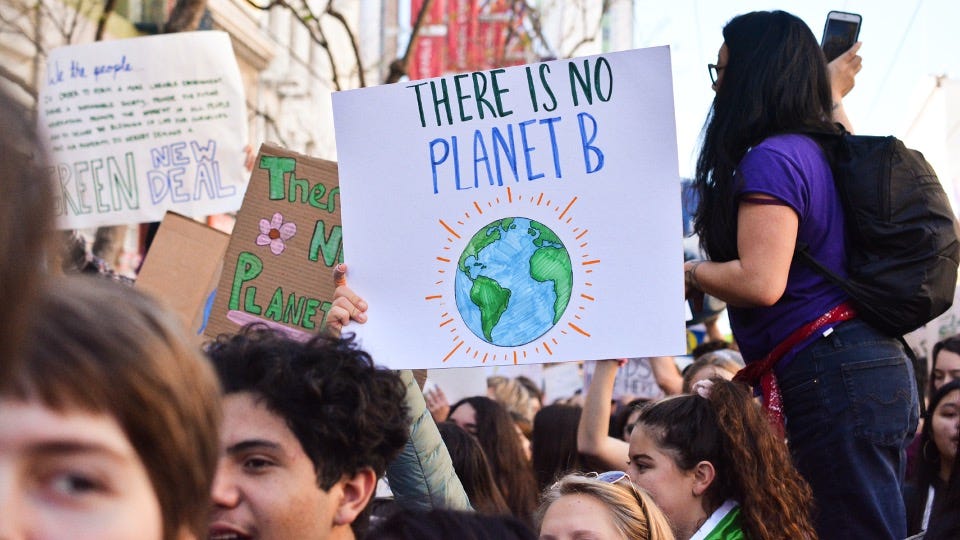The Changing Landscape of Hospitality
It's time to Abandon Buzzwords, Ditch the Scripts and Can the Clichés
Travel rebounded as pandemic restrictions eased and pent-up demand was released, and many voices were singing the tune of going back to pre-pandemic times.
Trust me. You don’t really want to go back.

We don’t want to go back to the times when tourists were unwanted in many locations, but the answer isn’t to turn the tourism tap off either.
When the dot.com boom bust, we didn’t shut the internet down.
When a reset comes, and resets will come, it’s vital to remember that the “good old days” weren’t as great as the better future we can create.
What’s the biggest challenge we face today?
Labour shortages? Climate change? Inflation? Geopolitical tension? Impact of AI and technology?
My answer to this often asked question is always
UNCERTAINTY
No matter how good our plans are and how certain we are of them, we never know what tomorrow will bring.
It’s easy to simplistically focus on the issues of the day without considering the uncertainties that will shape their development.
It’s better to focus on areas that will be impacted by these uncertainties. Instead of trying to “fix” the problem, a shift in mindset helps us change how we do things in ways that provide lasting and sustainable change.
Let’s look at three areas:
DEI, Sustainability, and Safety and Security.
First thing in the morning on the first day I worked in a hotel in 1987 I was handed a “Grooming Guide”. Everything from hair length to the knot in my tie, to the colour of my shoes was described in detail. There was even a drawing that showed hair must be trimmed so it was a quarter inch above the collar. No facial hair for males, unless you were a pilot (the hotel was owned by an airline). Pilots were allowed to have well-trimmed moustaches.
I had a beard.
I needed the job, but I was lazy, so I kept the beard and promised myself I would shave it off the second someone told me I was violating a grooming guide policy.
I still have the beard.
As the company grew, it expanded into new markets, including Turkey. At one point, the question came up:
“Could we ever hire a Turkish man as General Manager in one of our hotels?”
It was the 90s, we were part of the “businessman’s airline”. The question of hiring a Turkish female as General Manager wasn’t even on the table.
A worker on a building project in Egypt died.
When it was reported, the expat manager said a new person was already in place and there was no need for further follow-up.
“They don’t value life like we do”, he said, “This happens all the time. They just move on.”
I told him to go to Cairo, find the deceased person’s family, and find out how they were coping after the only breadwinner they had was dead.
“Then call me and tell me they don’t value life.”
When we hired the first female security guard, I had to work every shift with her until other security staff and other department heads accepted her and trusted that she was as competent as the other security staff.
She had a hotel management degree. She was more competent than the rest.
Creativity and innovation aren’t driven by men in suits in glass towers that spend their days looking at screens with numbers on them.
Creativity and innovation are driven by people facing challenges, overcoming obstacles and finding opportunities.
Opportunities are often hidden by bias.
Here are a few opportunities:
In Canada, statistics have shown that 13% of business travellers identify as LGBTQ. The rate for the general population is 6%.
How do hotels make this significant portion of the population feel welcome and safe?
Canada has a temporary foreign workers program and accepts thousands of refugees.
Who are these people?
Are they “TFW”s just labour that is here to solve a seasonal staffing shortage?
Are the refugees poor souls that we’re doing a favour by giving them menial work until they can return to their homeland?
Or are they people? Individuals, with lives, families, and feelings.
During a recent workshop session, we asked participants to share their best customer service stories. A young, Mexican immigrant that stocked shelves in the liquor store shared his story. His career began as a beach photographer in Cancun. He met a very unhappy American family. The father said to him:
“I hate my job, I hate my kids, I hate my wife, I hate my life. I wish I wasn’t here.”
The young photographer engaged with them. By the end of their sessions, they were all laughing and smiling together.
At Christmas a package arrived in Mexico. It was a framed picture of the smiling family on the beach. The father wrote in the card:
“Thank you! You saved my family and I think you saved my life. I keep a copy of this picture on my desk as a reminder of what you did for us and to remember what’s important in my life.”
As he told the story, the room fell silent and by the end, tears were flowing.
Suddenly, Nestor wasn’t just the Mexican guy that worked in the liquor store. He was Nestor, someone that used service, empathy, and caring to change people’s lives. He was a photographer, too. He was a person!
Everybody wanted to be like Nestor. Everybody wanted to change people’s lives. Everybody knew, that they had the opportunity to do just that.
Sustainability
Sustainability is a big topic. It almost seems new, but it’s been around for decades.
In the 1980s, hotels proudly proclaimed they were saving the planet by washing the linen less often, putting low-flow faucets in showers, and lower wattage bulbs in lamps.
Newsflash!
No matter what we do with it, the planet will be here long after we’re gone. It’s never been about saving the planet. It’s mostly been about saving money.
This past term, I taught a research class at a business school.
One of the students, Alex Stevens, looked into sustainability as part of his research and in his final presentation he showed two scenarios of what tourism and hospitality might look like in 2100.
In the worst-case scenario, he said we’d screw up, seas would rise, cities would flood, islands would disappear and many people would be living underwater. There would be no real travel and tourism. The best we could hope for would be Virtual Reality travel of what it was like in 2023.
In his best-case scenario, he said mass tourism would be gone, and travel would be more expensive, but probably more exciting as it would be special again and not something everyone took for granted.
His parting shot was: “In both scenarios, we still won’t be able to afford a house.😉”
This past winter, some ski resorts in Europe couldn’t open. There was no snow.
Our local resort had a banner year and there’s anticipation Europeans will show up in greater numbers thanks to the snow guarantee and our famous “champagne powder”.
It might be a short-term market bump.
Before the end of April this year, we had our first heatwave and the Spring snow melt was earlier than ever.
Banning plastic straws might make us feel good, but it’s not going to reverse climate change.
A headline on our local news site said, “Farmers are hoping for a normal season.”
Hope is not a great strategy for success.
What we’re experiencing is normal. It’s not a new normal. It’s just normal.
Sustainability plans need to include dealing with normal situations that we’ll experience. Mass evacuations. Supply chain disruptions. Mass migration.
Safety and Security
My hospitality career started in an emerging market. Most people didn’t have cars. Standalone bars and restaurants were uncommon and not often frequented by international travellers. The five-star hotel I worked in had an abundance of staff, many in-house restaurants that catered to our international guests and wealthy locals, and we had a large security department where I was employed as a security guard.
The emerging market country was Norway.
When markets “emerge” we suddenly find ourselves in a position where we can’t afford large security departments in hotels. We can’t afford any large departments.
We had a Scandinavian General Manager in a Northern European country that said security departments were unnecessary and that regular staff, of which numbers were drastically dwindling, and the local police and emergency services were enough to keep everyone safe and secure.
During the time when the company was still discussing whether a Turkish man could ever become a General Manager, the Scandinavian man was transferred and became General Manager at a hotel in Turkey. He invited me down and wanted me to convince head office that he needed a larger security department…
In times of uncertainty, incidents in hotels increase.
When there’s a downturn in the economy and the CFO says everyone should slash 25% of their costs, it’s probably a mistake to include slashing the security budget.
Especially today when “duty of care” regulations are increasingly applied around the world and after the ISO 31030 standard on Travel Risk Management was released last year, it’s clear that many companies with travelling employees and associates will be taking a closer look at the safety and security programmes of the accommodations they approve for company travel.
Not so fun fact: Some consulting companies are offering hotels to certify as being compliant - there is no certification for that, so hotels that pay to be “certified” as ISO31030 compliant are throwing money away.
Ignorance is more expensive than safety and security.
Staff retention is a big challenge in hospitality. Many people are disillusioned and feel they’re not seen, not valued, and they’re often not given any training or development.
In one hotel I know of, absenteeism in their stewarding department dropped from over 20% to almost zero. When HR asked them what had happened, their response was that they had been given some simple safety training in their department. Before the training they didn’t think anyone cared about them, afterwards, they understood that they were as important a cog in the wheel of operations as anyone else.
It’s not rocket science.
“You can’t sell security.” I’ve been told that too many times to count. Security is viewed as a cost and costs are to be kept at a minimum.
Security isn’t a cost. It’s a service.
We explained that to ten corporate clients. Just like with our other services, we asked them what their needs and wishes were. We worked with them to explain how our programme worked and how we could work together to resolve issues.
A year later we looked at the numbers.
The average client company in our top 100 had grown their business with us over the year by just over 14%.
The ten companies we developed security relationships with grew their business with us by over 42%. Three times more.
It’s not about saying you’re safer than your competitors, it’s about openly working with your clients to provide a service they understand and that you competently deliver.
Changing the Landscape
An expensive campaign that talks about getting more women into leadership roles will fail if you don’t hire more women.
DEI and Sustainability aren’t about feel-good marketing campaigns that don’t change the ways we work.
There’s hidden talent in your business, find them.
Security is about the everyday actions of every employee at every level. The UK Think Tank Demos showed us that as far back as 2006.
Changing the way we work to become more inclusive, to find the hidden talents, and to get everyone working to take care of themselves, the guests, the hotel and the world around us will also make jobs more meaningful and guest experiences more memorable.
It will make hospitality more attractive as a career choice for more people.
There’s no crystal ball.
There’s no quick fix.
There’s lots of uncertainty.
AI, machine learning, and technology will change a lot of our lives in a lot of ways and it can change very quickly.
Humans don’t change quickly. We evolve slowly.
Our hopes, dreams, desires, and needs for social connections and human interactions will remain. We need to acknowledge, value and make the most of the ones we have.
Our best opportunities reveal themselves when we Communicate, Collaborate, Contribute, and Care.
Stay safe, Always Care
Thanks for being part of the Always Care Community!
We help hospitality businesses make jobs more meaningful and guest experiences more memorable by helping you make the most of the biggest differentiator you have – your people!
We’re so passionate about hospitality that we wrote a book about it!
Let’s connect and discuss how we can help you.








